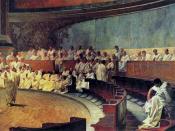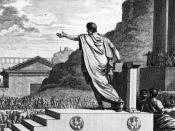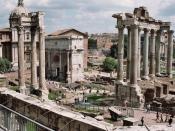During times in ancient Rome there were two distinct political classes, the Patricians and the Plebeians. The Patricians were rich and powerful noble families who managed to secure power over the less-fortunate Plebeian families. The Plebeians were the commoners. They were the merchants, farmers, soldiers, and artisans of Rome.
The Patricians expelled the Etruscan king and declared that Rome would be a republic. A republic is a form of government with elected officials. The Patricians elected senators to serve their interests. The Plebeians were allowed to vote, but only Patricians were allowed in the senate. Patricians monopolized all of the political offices in Rome.
The Patricians, while mostly secure in their wealth and noble foundation, were also unable to exist without the plebeians. The Plebeian class not only produced the grain and supplied the labor that maintained the Roman economy; they also formed the recruiting basis as soldiers for the Legions.
Many Plebian legionnaires returned back from military campaigns to find out that while they were gone they went bankrupt and Patricians bought up their farms, creating 'super farms'. The Patricians determined the price of grain, now that they were able to produce vast quantities of grain; this allowed the rich, to get richer.
In protest the Plebeians on several occasions, abandoned the city and went on strike. This left the Patricians without a working class to support them. Without the Plebeians the Patricians could not function. The Patricians were willing to compromise. Although the Senate did not give the Plebeians exactly what they wanted, it did create military tribunes. The tribunes were to be elected by small farmers and by the Patricians, and the tribunes could be either Plebeians or Patricians. The farmer-soldiers were encouraged by this increase in their participation in government. It gave them...



Social Structure in Ancient Rome
This essay has some good points, but it is so heavy-handed with its ideas of the rich oppressing the poor that it loses impact and credibility.
0 out of 1 people found this comment useful.